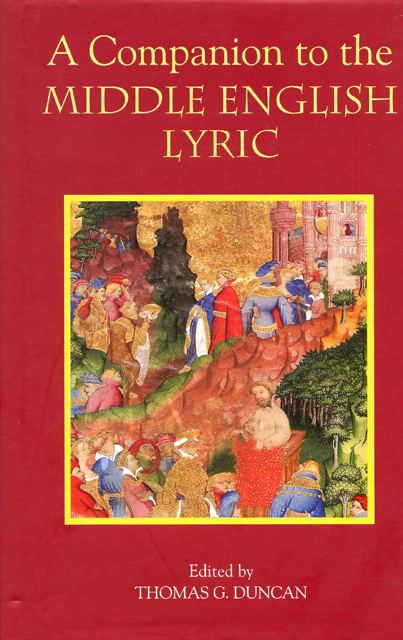Book contents
- Frontmatter
- Contents
- Acknowledgements
- Abbreviations
- Editorial Note
- Introduction
- 1 Middle English Lyrics and Manuscripts
- 2 Middle English Lyrics: Metre and Editorial Practice
- 3 The Love Lyric before Chaucer
- 4 Moral and Penitential Lyrics
- 5 Middle English Religious Lyrics
- 6 Middle English Courtly Lyrics: Chaucer to Henry VIII
- 7 The Middle English Carol
- 8 Political Lyrics
- 9 The Lyric in the Sermon
- 10 ‘Cuius Contrarium’: Middle English Popular Lyrics
- 11 Gender and Voice in Middle English Religious Lyrics
- 12 Lyrics in Middle Scots
- Bibliography of works cited
- Index of Manuscripts Cited
- General Index
- Index of Lyrics
7 - The Middle English Carol
Published online by Cambridge University Press: 23 March 2023
- Frontmatter
- Contents
- Acknowledgements
- Abbreviations
- Editorial Note
- Introduction
- 1 Middle English Lyrics and Manuscripts
- 2 Middle English Lyrics: Metre and Editorial Practice
- 3 The Love Lyric before Chaucer
- 4 Moral and Penitential Lyrics
- 5 Middle English Religious Lyrics
- 6 Middle English Courtly Lyrics: Chaucer to Henry VIII
- 7 The Middle English Carol
- 8 Political Lyrics
- 9 The Lyric in the Sermon
- 10 ‘Cuius Contrarium’: Middle English Popular Lyrics
- 11 Gender and Voice in Middle English Religious Lyrics
- 12 Lyrics in Middle Scots
- Bibliography of works cited
- Index of Manuscripts Cited
- General Index
- Index of Lyrics
Summary
John Audelay, ‘blind Audelay’ of Haghmond Abbey in Shropshire, closes one of his poems with the words:
I pray youe al pur charyte for the sake of
Redis this carol reverently, read
Fore I hit mad with wepyng ye; weeping eye
Mi name hit is the blynd Awdlay. (Whiting 1931, No. 24, 117–20)
The poem Audelay terms a carol is addressed to the Welsh saint Winefride, patron saint of Shrewsbury (Audelay's nearest town), whose intercession the poet implores and some of whose miracles he recounts. This is not the only poem to St Winefride in Audelay's oeuvre, a collection of over fifty poems in Bodl. MS Douce 302. This manuscript, which dates from the second quarter of the fifteenth century and is roughly contemporary with the poet, provides the main source of information about Audelay.
Audelay's poem conforms to the modern scholarly definition of the carol as a late Middle English lyric form ‘intended, or at least suitable, for singing, made up of uniform stanzas and provided with a burden which begins the piece and is to be repeated after each stanza’ (Greene, xi). This insistence on formal criteria is necessary as the term ‘carol’ has in general use come to mean all types of Christmas songs as well as many types of popular poems. This popular, ‘catholic’ view of the genre is, for instance, exemplified by the wide range of songs found in the New Oxford Book of Carols (Keyte and Parrott, 1992). Few of our better-known modern Christmas carols are carols in the medieval sense, although some, like ‘Hark, the herald angels sing’ or ‘Angels, from the realms of glory’, have a refrain (but no burden). Here, in Audelay's poem, the burden has two lines written at the beginning of the poem (as it happens, by a second hand):
Wenefrede, thou swete may, maiden
Thow pray for us bothe nyght and day. (Whiting 1931, 171)
- Type
- Chapter
- Information
- A Companion to the Middle English Lyric , pp. 150 - 170Publisher: Boydell & BrewerPrint publication year: 2005
- 3
- Cited by



